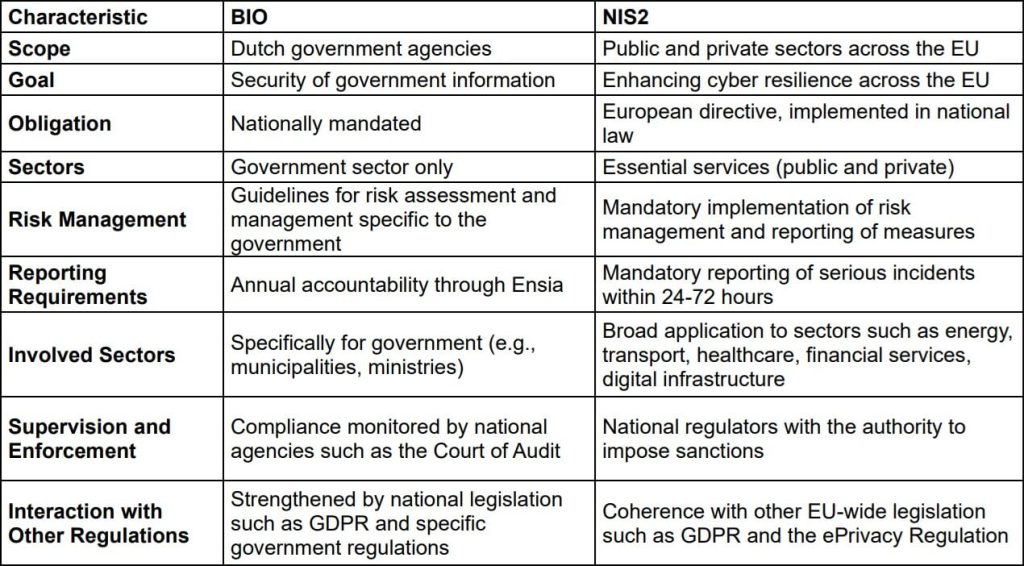Home The complexity of IT Regulations for municipalities

The complexity of IT Regulations for municipalities
About BIO, NIS2, and Solvinity’s secure cloud solutions
For IT and compliance officers in municipalities, the world is becoming increasingly complex. In addition to the daily challenge of managing a secure and efficient IT environment, municipalities face a myriad of regulations affecting their IT provisions. From the Baseline Information Security Government (BIO) to the European NIS2 Directive, compliance with these rules is not only mandatory but also essential to ensure the safety and continuity of municipal services.
But what exactly are the differences between these regulations? And how can municipalities meet the ever-stricter requirements while also dealing with budget cuts and limited IT capacity? In this blog, we provide a clear overview and show how Solvinity, with secure managed cloud solutions, can be a reliable partner.
BIO versus NIS2: what you need to know
The BIO is specifically designed for Dutch government organizations, including municipalities. It provides a framework for information security that helps safeguard the confidentiality, integrity, and availability of government information. The BIO is mandatory for all government organizations in the Netherlands and focuses on implementing measures tailored to the specific risks within the public sector.
On the other hand, the NIS2 Directive is a European legislation that targets the security of network and information systems across a wide range of sectors, including critical infrastructures such as energy, transport, and healthcare. This directive mandates both public and private entities considered essential to implement comprehensive security measures and report incidents.
Below is an overview of the main differences between BIO and NIS2:

In summary, the BIO provides guidelines specifically tailored to the Dutch government, while NIS2 follows a broader, European approach. However, both regulations are crucial for a secure and reliable IT infrastructure within municipalities.

Ensia: the cornerstone of municipal accountability
Ensia is an important part of municipal compliance efforts and certainly deserves attention in the context of IT and information security for municipalities. It is a crucial tool for ensuring compliance with, among others, the Baseline Information Security Government (BIO).
Ensia stands for Uniform Normative Single Information Audit and is a system that helps municipalities streamline their accountability in information security and compliance. The Ensia process ensures that municipalities report annually on their compliance with various legal standards, including the BIO, Data Protection Act (preceding the GDPR), and other relevant laws and regulations. The goal of Ensia is to provide a uniform and efficient way of accountability, contributing to transparency and accountability.
How Ensia, BIO, and NIS2 complement each other
Ensia and BIO are closely linked; Ensia serves as the mechanism by which municipalities can demonstrate their compliance with BIO. While BIO defines the specific security measures, Ensia helps municipalities systematically verify whether these measures are indeed implemented and effective. NIS2 adds a broader, European layer aimed at strengthening the resilience of critical infrastructures.
With Ensia, municipalities can gain insight into where they stand in terms of information security and where improvements can be made. This insight is essential for developing improvement plans and making strategic choices, such as deploying cloud solutions to better meet the requirements of both BIO and NIS2.

A secure cloud as a foundation
Complying with both BIO and NIS2 can be challenging, especially for municipalities facing limited resources and expertise. Solvinity can help municipalities make the Ensia process more efficient and effective. With our secure managed cloud solutions and compliance services, we provide a secure cloud as a foundation and support municipalities in gathering the necessary data and reporting it according to Ensia guidelines. This makes it easier for municipalities to meet their accountability requirements while simultaneously modernizing and securing their IT infrastructure.
In addition, we help municipalities develop a long-term strategy for IT maturity. This means not only meeting current regulations but also being prepared for future challenges and technological changes. In our recently published Cybersecurity Report 2024, we emphasize the importance of continuous improvement and adaptation to stay ahead in an ever-changing threat landscape.
Take the next step
It is clear that Ensia, along with BIO and NIS2, plays a central role in ensuring the security and compliance of municipal IT provisions. Solvinity is ready to support your municipality at every step of this process. Whether it involves implementing secure cloud solutions or optimizing your Ensia accountability, we offer the expertise and technology you need.
And because compliance goes far beyond ticking boxes, we provide tailored solutions that ensure compliance with BIO and NIS2 while also contributing to the resilience and flexibility of your IT infrastructure. Our cloud solutions are designed with security as a core principle, supported by advanced security technologies and 24/7 monitoring.
Do you have questions about how we can help your municipality? Contact us today and discover how we can make your IT environment secure, compliant, and future-proof. Together, we ensure that your municipality is ready for tomorrow’s challenges.
Sign up for the Solvinity Newsletter
Receive the latest news, blogs, articles and events.
Subscribe to our newsletter.
Other articles
More
In-house Security versus Outsourcing: the Dutch Approach to Security
Organisations face a choice: invest in their own internal security team, outsource to an external provider,...
READ MORECybersecurity and Organisational Resilience: Insights from 2025
Find out how Dutch organisations deal with digital threats, what their biggest challenges are, and how...
READ MOREZero Trust: a practical mindset for effective digital security
Discover how the Zero Trust approach protects your organisation against future digital threats in this article.
